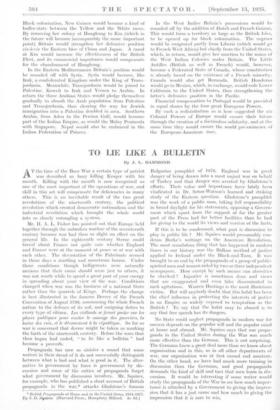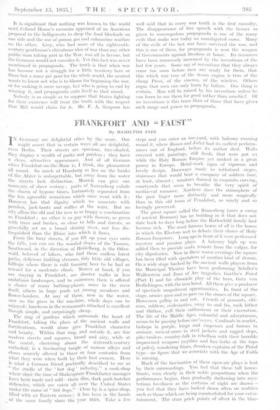TO LIE LIKE A BULLETIN
By J. L. HAMMOND AT the time of the Boer War a certain type of patriot was described as busy killing Kruger with his mouth. Killing with the mouth is now recognised as one of the most important of the operations of war, and skill in this art will compensate for deficiencies in many others. This is an inevitable result of the two great revolutions of the nineteenth century, the political revolution which created democratic nationalism and the industrial revolution which brought the whole world into so closely entangling a system.
Mr. II. A. L. Fisher has pointed out that Europe held together through the unbroken warfare of the seventeenth century because war had then so slight an effect on the general life. In the eighteenth century Sterne could travel about France not quite sure whether England and France were at the moment at peace or at war with each other. The devastation of the Palatinate seemed in those days a startling and monstrous horror. Under those conditions though belligerents were naturally anxious that their cause should seem just to others, it was not worth while to spend a great part of your energy in spreading about your view of the war. Conditions changed when war was the business of a national State rather than the quarrels of Kings. Perhaps the change is best illustrated in the famous Decree of the French Convention of August 1793, summoning the whole French nation to the defence of its soil, and assigning duties to every type of citizen. Les viellards se feront porter sur les places publiques pour exciter le courage -des guerriers, la baffle des roil, et le devouement a la rlpublique. So far as war is concerned that, decree might be taken as marking the birth of the nineteenth century. Before the wars that then began had ended, " to lie like a bulletin " had become a proverb; Propaganda has now so sinister a sound that some writers in their dread of it do not 'successfully distinguish between what is bad and what is good in it. The alter- native to government by force is government by dis- cussion and some of the critics of propaganda forget what government by discussion involves. Mr. Squires, for example, who has published a short account of British propaganda in the war,* attacks Gladstone's famous "British Propaganda at Home and in the United States, 1914-1917. By J. D. Squires. (Harvard Press; Humphrey Milford. 4s. 6d.) Bulgarian pamphlet of 1876. England was in great danger of being drawn into a most unjust war on behalf of Turkey and that danger was averted by Gladstone's efforts. Their value and importance have lately been vindicated in Dr. Seton-Watson's learned and striking study of the Eastern question. Gladstone's pamphlet was the work of a public man, taking full responsibility in broad daylight for his statements, opposing a Govern- ment which apart from the support of far the greater part of the Press had far better facilities than he had for giving to the world its views and version of the facts.
If this is to be condemned, what part is discussion to play in public life ? Mr. Squires would presumably con- demn Burke's writings on the American Revolution. The most scandalous thing that has happened in modern times in our history was the Balkan method of justice applied to Ireland under the Black-and-Tans. It was brought to an end by the propaganda of a group of public- spirited men and women aided by two or three independent newspapers. How except by such means can atrocities be checked ? Injustice is sometimes done and views that are exaggerated and even false disseminated in Such agitations. Warren Hastings is the most illustrious victim. But will anybody doubt that this habit has been the chief influence in protecting the interests of justice in an Empire so widely exposed to temptation as the British ? To say that the habit may be abused is to say that free speech has its dangers.
No State could neglect propaganda in modern war for success depends on the popular will and the popular mind at home and abroad. Mr. Squires says that our propa- ganda in the United States during the War was much more effective than the German. This is not surprising. The Germans knew a great deal more than we know about organisation and in this, as in all other departments of war, our organisation was at first casual and amateur. On the other hand, we have had much more training in discussion than the Germans, and good propaganda demands the kind of skill and tact that men learn in dis- cussion. It would be interesting if some writer would study the propaganda of the War to see how much impor- tance is attached by a Government to giving the impres- sion that it has a just cause and how much to giving the impression that it is sure to win. It is \significant that nothing was known to the world Until : Cdlonel House's memoirs appeared of an American . proposal to the belligerents to .drop the food blockade 'on one side and the use of poison gas and submarine warfare .on the:other. Grey, who had more of the eighteenth- . century. gentleman's chivalrous idea of war than any other public man taking part in the War, was all in favour, but the Germans would not consider it. Yet this fact was never mentioned in -propaganda. The truth is that when war has become not a struggle for a little territory here or there'but a sauve qui peat for the whole world, the neutral wants to know not who is to blame for beginning the war, or for making it inure savage, but who is going to end by Winning it,: and- propaganda suits itself to that mood.
Nobody is so simple as to suppose that States fighting • for their 'existence will treat the truth with the respect that Mill • would claim for it. Mr. F. A. Simpson has well said that in every war truth is the first casualty. The disappearance of free speech with the licence so given to unscrupulous propaganda is one of the many evils that make war today an unmitigated curse. Many of the. evils of the last war have survived the war, and this is one of them, for propaganda is now the weapon of Governments against freedom at home. Its resources have been immensely increased by the inventions of the last few years. Some say of inventions that they always come too soon • before men are ready for them, that this which was true of the steam engine is true of the cheap Press, of -the cinema, of the wireless. Others argue that •men can only learn by failure. One thing is certain. Man will be ruined by his inventions unless he can learn to use them for good rather than mischief. • Of no inventions is this truer than of those that have given such range and power to propaganda.







































 Previous page
Previous page